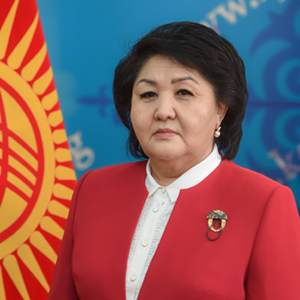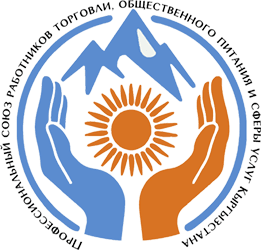
Chairman
Alymbaeva Elizaveta Berdievna
Professional Union of Trade, Public Catering, and Services Workers of Kyrgyzstan

Over the course of its existence, the Trade Union of Workers in Trade, Public Catering, Consumer Cooperation, and Other Forms of Entrepreneurship of the Kyrgyz Republic has undergone multiple transformations and name changes.
Pursuant to the decisions of the 4th Plenum of the All-Union Central Council of Trade Unions (ACCTU) and the Presidium of the ACCTU dated September 11, 1934, on reorganizing trade union work, 23 republican committees were divided into 42 republican committees and group committees.
On September 26, 1934, by the decision of the 2nd Plenum of Kyrgyzsovprof, the State Trade Union (“Soyuz Gostorgovli”) was divided into three professional unions: Union of Consumer Cooperation Workers, Union of State Trade Workers, Union of Book Trade Workers.
On March 11, 1937, by decision of the Presidium of KyrgSovprof, the Republican Committee of the Trade Union of State Trade Workers of the Kyrgyz SSR was established, which continued to exist until 1948. On November 23, 1948, in accordance with the decision of the ACCTU Presidium of October 25, 1948, the Republican Committee of the Trade Union of State Trade and Public Catering Workers was created. On August 19, 1957, it merged with the Republican Committee of the Trade Union of Consumer Cooperation Workers and was subsequently named the Republican Committee of the Trade Union of State Trade and Consumer Cooperation Workers of the Kyrgyz SSR.
On September 12, 1990, it was renamed the Republican Committee of the Trade Union of Trade, Public Catering, and Consumer Cooperation Workers of Kyrgyzstan.
On September 12, 1995, by resolution of the 2nd Congress of the Trade Union of Trade, Public Catering, Consumer Cooperation, and Other Forms of Entrepreneurship of the Kyrgyz Republic, it was reorganized into the Central Committee of the Trade Union of Trade, Public Catering, Consumer Cooperation, and Other Forms of Entrepreneurship of the Kyrgyz Republic.
The Trade Union of Trade, Public Catering, Consumer Cooperation, and Other Forms of Entrepreneurship of the Kyrgyz Republic is a public, self-governing, and independent organization that unites its members on a voluntary basis and possesses legal, organizational, and financial autonomy.
In its activities, the union is independent of governmental, economic management, political, and other organizations and is not accountable or subordinate to them.
On the basis of agreements and equality, it participates in republican and international trade union associations and cooperates with industry trade unions in the republic and with the trade unions of other countries in the interests of its members.
The union’s main task is to represent and defend the labor, socioeconomic, and professional rights and interests of its members at all levels of authority through its elected bodies. It consolidates the activities of all the union’s organizations to achieve set goals and strengthen trade union solidarity.
The structure of the Trade Union of Trade, Public Catering, Consumer Cooperation, and Other Forms of Entrepreneurship includes primary and regional trade union organizations, along with their elected bodies. Primary trade union organizations are formed in workplaces or educational institutions where at least three union members are present, and they may also be directly served by the republic-level union body.
Regional (city, district, oblast) organizations are formed through the voluntary association of corresponding trade union organizations or, taking their opinions into account, by decision of higher-level elected bodies.
The highest governing body of the union is the Congress, convened once every five years. The Congress hears reports on the activities of the Central Committee of the union and the audit commission, defines the union’s current objectives and action program, determines and approves the principles of the union’s organizational structure and activities, approves, amends, and supplements the Charter, approves the Program and the Regulations on the audit commission, confirms the authority of Central Committee members elected by trade union organizations through direct delegation, elects the committee chair and deputy chair, the audit commission, and delegates to congresses of republican trade union committees. Between congresses, as necessary, but at least once a year, the Plenum is convened to define the union’s current tasks arising from Congress decisions and the methods of their implementation; to elect the Central Committee, the Presidium of the Central Committee, its chair, and the Presidium’s deputy chair; to adopt amendments and additions to the Charter for subsequent approval at the Congress; to approve the Central Committee’s budget; to set the size of the deductions from union membership dues for financing the work of the Central Committee and its operating bodies; and to hear reports from the Presidium of the Central Committee.
Between congresses, the governing body of the trade union organization is the Central Committee, elected through direct representation from trade union organizations or at the Congress.
The Central Committee implements the decisions of the Congress and the action program, proposes amendments and additions to the Charter, and decides on convening the Congress of the Trade Union of Trade and Consumer Cooperation Workers. It defends the constitutional right to labor and full employment for able-bodied union members, unifies and coordinates the activities of trade union organizations and committees in addressing industry-wide issues, provides them with practical assistance in carrying out their rights and responsibilities, and arranges training for trade union personnel. The Central Committee determines the structure of the union within the republic, establishes regional union bodies in agreement with primary organizations, and resolves matters concerning the union services provided to primary union organizations.